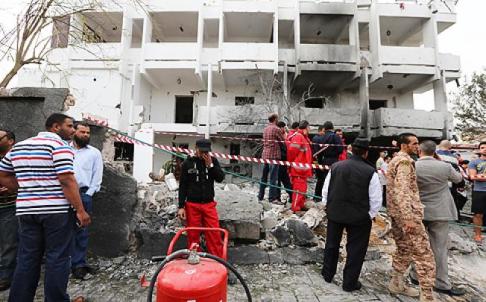
From AP: A car bomb targeted the French Embassy in the Libyan capital Tuesday, wounding two French guards and a Libyan teenager and underscoring the central government’s inability to stop the oil-rich North African nation’s slide toward deepening lawlessness. . . .
No group claimed responsibility for the attack on the French Embassy in Tripoli, but many blamed either Islamic extremists avenging France’s military intervention in Mali or militias seeking to send a message that they’re winning the struggle for control and that cracking down on them only backfires.
French President Francois Hollande denounced the attack as an assault not only on France but all countries engaged in the fight against terrorism.
“France expects the Libyan authorities to shed the fullest light on this unacceptable act, so that the perpetrators are identified and brought to justice,” Hollande said in a statement from Paris.
Two years after the country’s civil war, Libya is struggling to maintain security, build a unified army and rein in militias, which include rebels who fought to oust Gadhafi in 2011 and have refused to lay down their arms.
Prime Minister Ali Zidan and his defense and interior ministers have been increasingly cracking down on some militias in the capital. Zidan also has reached out to France and other countries for training and technical aid in building the country’s security forces from scratch.
On the one hand, the Libyan government heavily depends on security provided by commanders of powerful militias, with top Libyan leaders dubbing some “legitimate” forces while others like Ansar al-Shariah are labeled as outlaws.
However, both categories of militias often act with impunity, running their own prison cells, making arrests and taking confessions in total absence of state control and oversight. They at the same time enjoy steady and lavish salaries and rewards.
“The Number One party benefiting from these attacks is the militias and the extremists. Whenever we take a step forward, an attack by these groups drags us back,” said lawmaker Tawfiq Breik, from the liberal-leaning National Forces Alliance bloc in parliament. . . .
Libyans have been staging protests and sit-ins demanding that authorities label all militias illegal. The protesters want militia commanders and their fighters to integrate into the Libyan army as individuals. If they integrate into the army as groups, they say the fighters will maintain their loyalty to their militia commanders.
The assault will increase pressure already mounting on the country’s top army chief Maj. Gen. Youssef al-Mangoush who is blamed for Libya’s failure to take any concrete steps to build its army, allowing the militias to expand. . . .
French officials, meanwhile, have expressed concerns about the possibility of greater instability in Libya, where they believe at least some rebel fighters from Mali fled following France’s military onslaught to dislodge al-Qaida-linked militants who controlled the vast north of the West African country for months.
Last week, al-Qaida in the Islamic Maghreb, or AQIM, threatened to seek revenge against all countries taking part in the war in Mali, warning that no one who “participated in this ferocious attack” will be safe. It called on “all Muslims to target France and its interests and subjects inside and outside France until it withdraws the last soldier from the land of the Muslims and lifts its support of rulers of the region.” That threat came as part of a question and answer session on AQIM’s new Twitter account. (photo: AFP)
Image: afp%204%2023%2013%20libya-france-unrest-embassy.jpg
